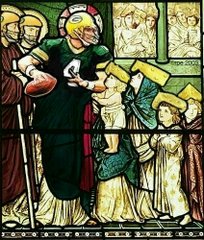 Prayer
PrayerAlmighty God, graciously behold this Your family, for whom our Lord Jesus Christ was willing to be betrayed, to be given into the hands of sinners, and to suffer death on the cross; who now lives and reigns with You and the Holy Spirit, one God, now and forever.
Devotional Reading
Athanasius, Bishop of Alexandria & confessor of the faith after whom the Athanasian Creed is named, writes of the Crucifixion of our Lord:
But if any honest Christian wants to know why the Lord suffered death on the cross a...nd not in some other way, we answer thus; in no other way was it expedient for us, indeed the Lord offered for our sakes the one death that was supremely good. He had come to bear the curse that lay on us; and how could He “become a curse” otherwise than by accepting the accursed death? And that death is the cross, for it is written “Cursed is every one that hangs on a tree. [Deuteronomy 21:23, Galatians 3:13]”
Again, the death of the Lord is the ransom of all, and by it “the middle wall of partition” [Ephesians 2:14] is broken down and the call of the Gentiles comes about. How could He have called us if He had not been crucified, for it is only on the cross that man dies with arms outstretched?
Here again, we see the fitness of His death and of those outstretched arm: it was that He might draw His ancient people with one and the Gentiles with the other, and join both together in Himself. Even so, He foretold the manner of His redeeming death, “I, if I be lifted up, will draw all men unto Myself. [John 12:23]”
Catechesis
Luther's Large Catechism
V. The Sacrament of the Altar
Admonition and Encouragement Regarding the Sacrament for those asking why, if we have already been forgiven, one needs to receive the Lord's Supper.
We have, in the first place, the clear text in Christ’s very words, “Do this in remembrance of Me” [Luke 22:19]. These are inviting and commanding words by which all who would be Christians are told to partake of this Sacrament. Therefore, whoever wants to be Christ’s disciple, with whom He here speaks, must also consider and keep this Sacrament. They should not act from compulsion, being forced by others, but in obedience to the Lord Jesus Christ, to please Him. 46 However, you may say, “But the words are added, ‘As often as you drink it’; there He compels no one, but leaves it to our free choice.” 47 I answer, “That is true, yet it is not written so that we should never do so. Yes, since He speaks the words ‘As often as you drink it,’ it is still implied that we should do it often. This is added because He wants to have the Sacrament free. He does not limit it to special times, like the Jewish Passover, which they were obliged to eat only once a year. They could only have it on the fourteenth day of the first full moon in the evening [Exodus 12:6, 18]. They still must not change a day.” It is as if He would say by these words, “I institute a Passover or Supper for you. You shall enjoy it not only once a year, just upon this evening, but often, when and where you will, according to everyone’s opportunity and necessity, bound to no place or appointed time.” 48 But the pope later perverted this and again made the Sacrament into a Jewish feast.
49 So you see, it is not left free in the sense that we may despise it. I call that despising the Sacrament if one allows a long time to elapse—with nothing to hinder him—yet never feels a desire for it. If you want such freedom, you may just as well have the freedom to not be a Christian and not have to believe or pray. One is just as much commanded by Christ as the other. But if you want to be a Christian, you must from time to time fulfill and obey this commandment. 50 For this commandment ought always to move you to examine yourself [1 Corinthians 11:28; 2 Corinthians 13:5] and to think, “See, what sort of a Christian I am! If I were one, I would certainly have some small longing for what my Lord has commanded me to do.”
51 Since we act like strangers toward the Sacrament, it is easy to see what sort of Christians we were under the papacy. We went to the Sacrament from mere compulsion and fear of human commandments, without natural longing and without love, and never thought about Christ’s commandment. 52 But we neither force nor compel anyone. Nor does anyone have to do it to serve or please us. This should lead and constrain you by itself, that the Lord desires it and that it is pleasing to Him. You must not let people force you to faith or any good work. We are doing no more than talking about and encouraging you about what you ought to do—not for our sake, but for your own sake. The Lord invites and allures you. If you despise it, you must answer for that yourself [2 Corinthians 5:10].
53 Now, this is to be the first point, especially for those who are cold and indifferent. Then they may reflect upon it and rouse themselves. For this is certainly true, as I have found in my own experience, and as everyone will find in his own case: if a person withdraws like this from the Sacrament, he will daily become more and more callous and cold, and will at last disregard the Sacrament completely. 54 To avoid this, we must examine our heart and conscience [1 Corinthians 11:28; 2 Corinthians 13:5], and we must act like people who desire to be right with God [Psalm 78:37]. The more this is done, the more the heart will be warmed and enkindled, so it may not become entirely cold.
55 But if you say, “How can I come if I feel that I am not prepared?” Answer, “That is also my cause for hesitation, especially because of the old way under the pope.” At that time we tortured ourselves to be so perfectly pure that God could not find the least blemish in us. For this reason we became so timid that we were all instantly thrown into fear and said to ourselves, “Alas! we are unworthy!” 56 Then nature and reason begin to add up our unworthiness in comparison with the great and precious good. Then our good looks like a dark lantern in contrast with the bright sun, or like filth in comparison with precious stones. Because nature and reason see this, they refuse to approach and wait until they are prepared. They wait so long that one week trails into another, and half the year into the other. 57 If you consider how good and pure you are and labor to have no hesitations, you would never approach.
58 Therefore, we must make a distinction here between people. Those who are lewd and morally loose must be told to stay away [1 Corinthians 5:9–13]. They are not prepared to receive forgiveness of sin, since they do not desire it and do not wish to be godly. 59 But the others, who are not such callous and wicked people, and who desire to be godly, must not absent themselves. This is true even though otherwise they are feeble and full of infirmities. For St. Hilary also has said, “If anyone has not committed sin for which he can rightly be put out of the congregation and be considered no Christian, he ought not stay away from the Sacrament, lest he should deprive himself of life.” 60 No one will live so well that he will not have many daily weaknesses in flesh and blood.
61 Such people must learn that it is the highest art to know that our Sacrament does not depend upon our worthiness. We are not baptized because we are worthy and holy. Nor do we go to Confession because we are pure and without sin. On the contrary, we go because we are poor, miserable people. We go exactly because we are unworthy. This is true unless we are talking about someone who desires no grace and Absolution nor intends to change.
62 But whoever would gladly receive grace and comfort should drive himself and allow no one to frighten him away. Say, “I, indeed, would like to be worthy. But I come, not upon any worthiness, but upon Your Word, because You have commanded it. I come as one who would gladly be Your disciple, no matter what becomes of my worthiness.” This is difficult. 63 We always have this obstacle and hindrance to encounter: we look more upon ourselves than upon Christ’s Word and lips. For human nature desires to act in such a way that it can stand and rest firmly on itself. Otherwise, it refuses to approach. Let this be enough about the first point.
Concordia : The Lutheran Confessions. Edited by Paul Timothy McCain. St. Louis, MO : Concordia Publishing House, 2005, S. 436






No comments:
Post a Comment